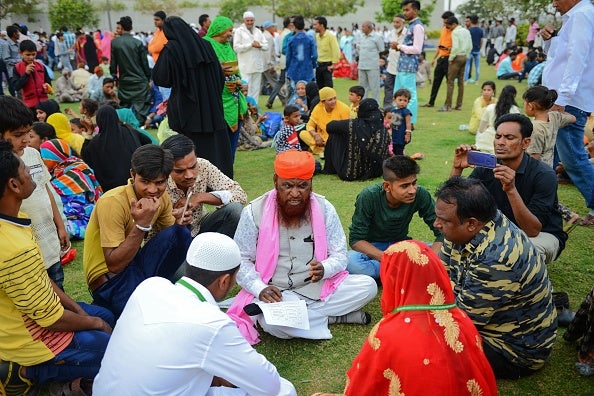Indian ‘Love Jihad’ law will be used to entrap and harass interfaith couples, rights lawyers say
Senior lawyers argue new laws brought in to appease Hindu right wing are unnecessary and ‘racially hostile’. They tell Namita Singh that there is a much simpler way to stop Hindu girls converting for sake of marriage


A new law brought in by the government of India’s most populous state will be used to harass and incarcerate legitimate interfaith couples, rights lawyers have warned.
The law against so-called “Love Jihad”, an Islamophobic conspiracy theory, was passed as an executive order by the BJP government of right-wing Hindu monk-turned-chief minister Yogi Adityanath in the state of Uttar Pradesh.
It makes “unlawful” religious conversion a punishable offence with a jail term up to 10 years, and will apply in cases where conversion is a result of marriage, misrepresentation, force, undue influence or other “fraudulent” means.
The law comes amid increasing numbers of mainstream references to the existence of “Love Jihad”, the claim that Muslim men are conspiring to convert Hindu women to Islam by seduction and forced marriage. Successive police probes have found no evidence of such a conspiracy.
But those clamouring over “Love Jihad” claimed vindication after the Allahabad High Court ruled in September that conversion “just for the purpose of marriage” was unacceptable, and several BJP-led states have since vowed to bring laws over the issue.
Speaking to The Independent, leading rights lawyers dubbed the Uttar Pradesh law “racially hostile legislation targeting Muslims” and “a political gimmick".
“This is totally unconstitutional,” said Colin Gonsalves, a senior Supreme Court advocate and founder of the Human Rights Law Network.
“Article 21 of the Indian constitution gives the right to life. Can there be a right to life without a right to love? The right to love the person of your choice is at the core of Article 21. And the right to love does not recognise barriers or boundaries like religion or caste,” Mr Gonsalves said.
Rebecca John, a leading criminal defence lawyer, told The Independent that the only matter the court asks about in such cases is whether the couple, as consenting adults, are happy to be together. “If they are, then they can do nothing,” she said.
“This law is only meant to harass the interfaith couple, especially those who do not have the legal means to stand up to the pressure,” she said.
Indian law allows for interfaith couples to be wed under the Special Marriage Act, which does not require conversion on the side of either bride or groom – but it does stipulate that a written notice be sent to the “residential address” of both.
This becomes a problem for interfaith couples who want to marry against the protestations of their families – in such situations, getting a religious marriage “is the safest option”, writes the lawyer Neetika Vishwanath. But the girl, if she is marrying a Muslim boy, is then required to convert under the law.
These are the kinds of marriage that conservative Hindu groups take issue with – indeed, such claims are often brought on the part of the bride’s family.
Mr Gonsalves says that the question at the heart of the matter remains whether a conversion in such cases is forceful – as the UP “Love Jihad” law would argue it is.
“Let’s say a Hindu girl wants to marry a Muslim boy. She wants to marry him. Now, she is looking for a way of doing it. She is not being terrorised into converting. She is finding a convenient way of marrying the guy. So, what’s wrong? Where is the force?”
Forceful conversion is already illegal in India and there are existing laws against it, Ms John argues. “Because the notices are public and are used to harass the interfaith couple, the couple is forced to take the religious route to solemnise their marriage. And since we live in a society which is largely patriarchal, the girl agrees to convert. She does not convert because she is suddenly in love with another religion. So, for this patriarchy is to be blamed [not the couple].”
Mr Gonsalves said that the solution to ending unnecessary conversions of Hindu women is simply to get rid of the notice period required for interfaith marriages. “They should do away with it. Anybody who wants to get married at any time has to just go to anybody and declare. Why should there be a notice period? Particularly when you know that putting up a notice results in retaliation and violence. They should just delete that provision.”



Join our commenting forum
Join thought-provoking conversations, follow other Independent readers and see their replies
Comments